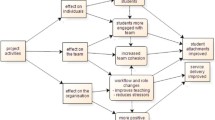Abstract
Continued changes to healthcare delivery in the UK, and an increasing focus on patient safety and quality improvement, require a radical rethink on how we enable graduates to begin work in challenging, complex environments. Professional regulatory bodies now require undergraduate medical schools to implement an ‘assistantship’ period in the final year of study, where senior medical students ‘shadow’ the work of junior doctors, with an expectation that they will be better ‘prepared’ for work. However, there is little guidance about what an ‘assistantship’ entails and the current emphasis on preparedness of students arguably underplays the importance of contextualised learning within the workplace environment. This paper will describe a modified Development Work Research (DWR) (Engeström in Developmental work research: activity theory in practice. Lehmanns Media, Berlin, 2005) approach to organisational change, enabling academic, clinical and administrative partners to develop assistantship placements in different hospitals. Our findings indicate that a modified DWR approach can reveal factors indicating organisational readiness to support change within a locally contextualised framework. The process has significant practical applications across a range of healthcare disciplines, as all professions seek to engage with the challenge of enabling successful transitions of graduates to the workplace.



Similar content being viewed by others
References
Berridge, E. J., Freeth, D., Sharpe, J., & Roberts, C. M. (2007). Bridging the gap: supporting the transition from medical student to practicing doctor—a 2 week preparation programme after graduation. Medical Teacher, 29, 119–127.
de Feijter, J. M., de Gave, W. S., Dornan, T., Koopmas, R. P., & Scerpbier, A. J. J. A. (2011). Students’ perceptions of patient safety during the transition from undergraduate to postgraduate training: an activity theory analysis. Advances in Health Sciences Education, 16, 47–58.
Edwards, A. (2010). Being an expert professional practitioner: The relational turn in expertise. Volume 3 of the Professional and practice-based learning series. London: Springer.
Engeström, Y. (1987). Learning by expanding: An activity-theoretical approach to developmental research. Helsinki: Orienta-Konsultit.
Engeström, Y. (1999). Innovative learning in work teams: Analysing cycles of knowledge creation in practice. In Y. Engeström, R. Miettinen, & R- L. Punamäki (Eds.), Perspectives on activity theory (pp. 377–406). Cambridge: Cambridge University Press.
Engeström, Y. (2001). Expansive learning at work: toward an activity theoretical reconceptualisation. Journal of Education and Work, 14(1), 133–156.
Engeström, Y. (2005). Developmental work research: Activity theory in practice. Berlin: Lehmanns Media.
Engeström, Y. (2007). Enriching the theory of expansive learning: Lessons from journeys towards co-configuration. Mind Culture and Activity, 14(1–2), 23–39.
Engeström, Y., & Sannino, A. (2010). Studies of expansive learning: Foundations, findings and future challenges. Educational Research Review, 5, 1–24.
Fenwick, T., Edwards, R., & Sawchuk, P. (2011). Emerging approaches to educational research: Tracing the socio-material. London: Routledge.
General Medical Council. (2009b). Clinical placements for students: advice supplementary to Tomorrow’s doctors. Retrieved 16 Dec 2012. http://www.gmc-uk.org/Clinical_placements_for_medical_students_0211.pdf_48902981.pdf
General Medical Council. (2012). National training survey: Key findings. Retrieved 16 Dec 2012. http://www.gmc-uk.org/National_training_survey_2012_key_findings_report.pdf_49280407.pdf
Guile, D. (2009). Conceptualizing the transition from education to work as vocational practice: lessons from the UK’s creative and cultural sector. British Educational Research Journal, 35(5), 761–779.
Hager, P., Lee, A., & Reich, A. (Eds.). (2012). Practice, learning and change: practice-theory perspectives on professional learning. Dordecht: Springer.
Illing, J., Morrow, G., Kergon, C., Burford, B., Peile, E., Davies, C., et al. (2008). How prepared are medical graduates to begin practice? A comparison of three diverse UK medical schools. Final report for the GMC Education Committee. London: General Medical Council/Northern Deanery.
Keogh, B. (2012). ‘Killing season’ on NHS wards: Patients at risk when junior doctors start new jobs, says health boss’. Daily Mail. Retrieved 23 March 2013. http://www.dailymail.co.uk/news/article-2163382/NHS-wards-Patients-risk-junior-doctors-start-new-jobs-says-health-boss-Sir-Bruce-Keogh.html. Accessed 23 March 2013.
Kilminster, S., & Zukas, M. (2013). Responsibility matters: Putting illness back into the picture. Journal of Workplace Learning, 25(6), 1–12.
Kilminster, S., Zukas, M., Quinton, N., & Roberts, T. (2011). Preparedness is not enough: Understanding transitions as critically intensive learning periods. Medical Education, 45, 1006–1015.
Morris, C. (2012). From classroom to clinic: An activity theory perspective. In V. Cook, V. C. Daly, & M. Newman (Eds.), Work-based learning in clinical settings. Insights from socio-cultural perspectives (pp. 85–102). Oxford: Radcliffe Publishing.
O’Brien, B. C., & Poncelet, A. N. (2010). Transition to clerkship courses: Preparing students to enter the workplace. Academic Medicine, 85(12), 1862–1869.
Roth, W.-M., & Lee, Y.-J. (2007). Vygotsky’s neglected legacy: Cultural–historical activity theory. Review of Educational Research, 77(2), 186–232.
Author information
Authors and Affiliations
Corresponding author
Rights and permissions
About this article
Cite this article
Reid, AM., Ledger, A., Kilminster, S. et al. Can the tools of activity theory help us in advancing understanding and organisational change in undergraduate medical education?. Adv in Health Sci Educ 20, 655–668 (2015). https://doi.org/10.1007/s10459-014-9553-1
Received:
Accepted:
Published:
Issue Date:
DOI: https://doi.org/10.1007/s10459-014-9553-1



